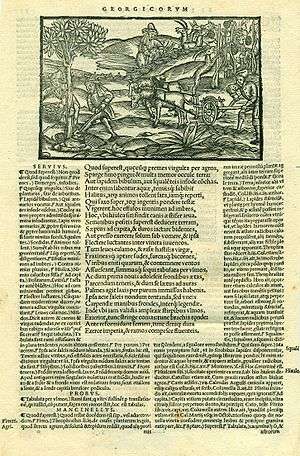Maurus Servius Honoratus
Maurus Servius Honoratus was a late fourth-century and early fifth-century grammarian, with the contemporary reputation of being the most learned man of his generation in Italy; he was the author of a set of commentaries on the works of Virgil. These works, In tria Virgilii Opera Expositio, constituted the first incunable to be printed at Florence, by Bernardo Cennini, 1471.


In the Saturnalia of Macrobius, Servius appears as one of the interlocutors; allusions in that work and a letter from Symmachus to Servius indicate that he was not a convert to Christianity.
Commentary on Virgil
The commentary on Virgil (Latin: In Vergilii Aeneidem commentarii) has survived in two distinct manuscript traditions.[1] The first is a comparatively short commentary, which is attributed to Servius in the superscription in the manuscripts and by other internal evidence. A second class of manuscripts, all deriving from the 10th and 11th centuries, embed the same text in a much expanded commentary. The copious additions are in contrast to the style of the original; none of these manuscripts bears the name of Servius, and the commentary is known traditionally as Servius auctus or Servius Danielis, from Pierre Daniel who first published it in 1600.[2] "The added matter is undoubtedly ancient, dating from a time but little removed from that of Servius, and is founded to a large extent on historical and antiquarian literature which is now lost. The writer is anonymous and probably a Christian",[3] although not if, as is often suggested, he is Aelius Donatus. A third class of manuscripts, written for the most part in Italy, gives the core text with interpolated scholia, which demonstrate the continued usefulness of the Virgilii Opera Expositio.
The authentic commentary of Maurus Servius Honoratus is in effect the only complete extant edition of a classic author written before the collapse of the Empire in the West. It is constructed very much on the principle of a modern edition, and is partly founded on an extensive Virgilian critical literature, much of which is known only from the fragments and facts preserved in this commentary. The notices of Virgil's text, though seldom or never authoritative in face of the existing manuscripts, which go back to, or even beyond, the time of Servius, yet supply valuable information concerning the ancient recensions and textual criticism of Virgil. In the grammatical interpretation of his author's language, Servius does not rise above the stiff and overwrought subtleties of his time; while his etymologies, as is natural, violate every modern law of sound and sense in favour of creative excursus.
Servius set his face against the prevalent allegorical methods of exposition of text. For the antiquarian and the historian, the abiding value of his work lies in his preservation of facts in Roman history, religion, antiquities and language, which but for him might have perished. Not a little of the laborious erudition of Varro and other ancient scholars has survived in his pages.
Other works
Besides the Virgilian commentary, other works of Servius are extant: a collection of notes on the grammar (Ars grammatica) of Aelius Donatus; a treatise on metrical endings in verse (De finalibus); and a tract on the different poetic meters (De centum metris).
The edition of Georg Thilo and Hermann Hagen (1878–1902), remains the only edition of the whole of Servius' work. Currently in development is the Harvard Servius (Servianorum in Vergili Carmina Commentariorum Editio Harvardiana); of the projected five volumes, two have so far appeared, i (Aeneid 1–2), 1946, and ii (Aeneid 3–5), 1965.
References
Citations
- The manuscript tradition is examined by Charles E. Murgia, Prolegomena to Servius 5: the manuscripts (University of California Classical Studies 11), University of California Press, 1975.
- (in Italian) I. Biffi and C. Marabelli (eds.), Figure del pensiero medievale. Fondamenti e inizi IV-IX secolo, Jaca Book, 2009, p. 306
- Encyclopædia Britannica 1911: sub "Servius Maurus Honoratus"
Sources
- E. K. Rand, "Is Donatus's Commentary on Virgil Lost?" Classical Quarterly 10 (1916), 158–164. Donatus's authorship of the supplementary material.
- "The Manuscripts of the Commentary of Servius Danielis on Virgil", Harvard Studies in Classical Philology 43 (1932), 77–121;
- "The Manuscripts of Servius's Commentary on Virgil", Harvard Studies in Classical Philology 45 (1934), 157–204.
- Casali, Sergio and Fabio Stok (edd.). Servio: stratificazioni esegetiche e modelli culturali / Servius: exegetical stratifications and cultural models (Bruxelles: Éditions Latomus, 2008) (Collection Latomus, 317).
External links
| Latin Wikisource has original text related to this article: |
- Commentary on the Aeneid of Vergil at the Perseus Project in Latin.
- Commentary on the Eclogues of Vergil at the Perseus Project in Latin.
- De Centum Metris at Intratext.com
- De Centum Metris at Forum Romanorum
- Servii grammatici qui feruntur in Vergilii carmina commentarii, Georius Thilo, Hermannus Hagen (ed.), 3 vol., Lipsiae in aedibus B. G. Teubneri, 1881–1902: vol. 1, vol. 2, vol. 3 part 1, vol. 3 part 2.